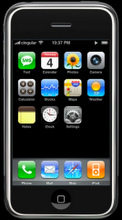Don't you just love this Burton Smith guy? I hired him, don't let Ballmer tell you any different. He didn't want to talk this smack about Apple at first, but we hung out for a while, offered him Kool Aid now and then. He came around.
Burton Smith as quoted by El Reg:
Facing up to parallelism
"Reinvention" could make all of that obsolete almost over night. It is not a route that he favours, however. "One option with the move to parallelisation is to simply wipe the slate clean and start again with something new," he said. "This is what I call the Apple approach, where a great new technology is introduced with not much thought given to the pain it might cause users of an earlier technology. But we have to take existing users with us."

El Reg is still my favorite tool. They are so snarky that hardly anybody realizes that they actually are an MS Tool. I just love how they let our guy slip that comment in, with nary a passing reference to the fact that it's Apple who has a marvelous track record of integrating new technologies without completely horking over their existing customer base. They switched processor architectures from PowerPC to Intel and their customers scarcely noticed, save the new machines had snappy dual core architectures. Some years before that they managed a similar transition from m68k to PowerPC. The transition from Mac OS 9 to the UNIX based and entirely different Mac OS X went far better than industry pundits and analysts predicted. In fact, these recent transitions, to a new UNIX OS and new Intel CPU, went so well that their market share started growing again.
Apple just pulled off another transition, the port of Mac OS X to the ARM processor architecture, so smoothly that nobody even talks about the fact that they had to port the system to a new platform at the same time as they were re-inventing the entire approach to software on a cell phone. They sure didn't disrupt any users in that scenario, but they damn sure disrupted an entire industry over the weekend, an industry they were not even a player in last week.
Meanwhile, we at Microsoft force our customers to upgrade MS Office en-masse by tweaking file formats every release, and by making sure that the file format architecture precludes forward compatibility. I just love that scheme. Whenever somebody mails out a copy of an Office document from a new MS Office version to a bunch of people, the upgrade orders roll in. Ka-ching!
El Reg doesn't even mention that we try our darnedest (we really do!) to force everyone to throw out their old hardware and get new hardware as often as possible. By contrast, Apple tries to support the oldest Apple hardware they can, even laying hardware foundations like adding USB to all machines or increasing the baseline RAM in new systems. See, Apple does this because it helps boost the Apple presence in the market. Customers who would buy new machines do so anyway, but if the older machines are still useful, they are typically gifted to someone who then becomes an Apple convert. The next time they buy a new machine, it's an Apple. Reg is helping us seed the meme that Apple disrupts their customers, when in reality, Apple's lust for open standards is only disrupting the Microsoft mind-lock on the industry. El Reg, long may you obfuscate.




